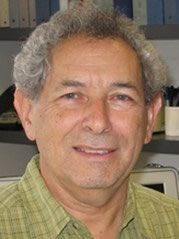Tom Blumenthal, PhD

Director Emeritus, Linda Crnic Institute for Down Syndrome
Professor, Molecular, Cellular and Developmental Biology, University of Colorado
Tom Blumenthal was born in Santa Monica, California in 1943, but grew up in Elkins Park, Pennsylvania, a suburb of Philadelphia. He majored in Biology at Antioch College in Yellow Springs, Ohio and graduated in 1966. He was an NSF fellow during his graduate work at Johns Hopkins University from which he received his PhD in Genetics in 1970. His thesis was in the area of bacteriophage genetics.
Dr. Blumenthal’s research currently concentrates in the areas of mechanisms of pre-mRNA processing in C. elegans and how that relates to organization of genes on chromosomes. Working in the C. elegans model system, Dr. Blumenthal’s lab discovered the first eukaryotic operons, now known to exist in many other phyla even including primitive chordates. His lab focuses on mechanistic aspects of coordination of multiple kinds of RNA cleavage and splicing events in eukaryotic polycistronic pre-mRNA processing. He has published more than 100 papers and one book in the areas of genetics and molecular biology.
In 2012, Dr. Blumenthal became Executive Director of Linda Crnic Institute for Down Syndrome at the University of Colorado Health Sciences Center at Anschutz Medical Campus. At the Crnic Institute, Dr. Blumenthal leads a “Dream Team” of experts with more than 80 years of combined experience in caring for children with Down syndrome and developmental disabilities including Dr. Huntington Potter who studies the relationship between Alzheimer’s Disease and Down syndrome, and Dr. Katheleen Gardiner, who studies gene expression alterations in Down syndrome. As Executive Director of the LCI, Dr. Blumenthal also manages the Anna and John J. Sie Center for Down Syndrome, including Sie Center clinical director Dr. Fran Hickey, program coordinator Dee Daniels, and senior physical therapist Patricia C. Winders.
Prior to this engagement, Dr. Blumenthal was the Chair of Molecular, Cellular and Developmental Biology at the University of Colorado at Boulder since 2006, where he continues to hold his position as professor of Molecular, Cellular and Developmental Biology, in addition to running his RNA lab at CU Boulder. From 1997 to 2006, Dr. Blumenthal served as the Chairman of the Biochemistry and Molecular Genetics Department at the University of Colorado School of Medicine.
Dr. Blumenthal is currently on the Editorial Boards of the journals RNA, Molecular and Cellular Biology, Transcription, and Worm, and the online book, Wormbook. He has served on the Boards of Directors of the American Medical and Graduate Departments of Biochemistry, the American Society of Biochemistry and Molecular Biology, the RNA Society and the Scientific Advisory Board of Wormbase, the C. elegans database. He also served as a member of the University of California Science and Technology Committee and the Scientific Advisory Boards of the Biological Science Divisions of the Los Alamos and Lawrence Livermore National Laboratories. He was elected to membership in the American Academy of Arts and Sciences in 2010.
Dr. Blumenthal was a Helen Hay Whitney Foundation postdoctoral fellow with James Watson at Harvard, where he showed that bacteriophage QB replicase contains protein synthesis elongation factors. In 1973, he became an Assistant Professor at Indiana University, where he remained until 1996, rising through the ranks to Professor and Chairman of Biological Sciences. In 1980, as a Guggenheim fellow, he did a sabbatical with Sydney Brenner at the MRC in Cambridge, where he began working on the nematode C. elegans. He studied developmental gene regulation and later began his current projects on mechanisms of splicing and chromosomal gene organization. In 1993 he did a sabbatical with Barbara Meyer at Berkeley where he worked on C. elegans 3’ splice site recognition.

 Experience our inspirational and groundbreaking videos and photos. Our children and self-advocates are beautiful AND brilliant!
Experience our inspirational and groundbreaking videos and photos. Our children and self-advocates are beautiful AND brilliant! Make sure your local Representatives are on the Congressional Down Syndrome Task Force.
Make sure your local Representatives are on the Congressional Down Syndrome Task Force.